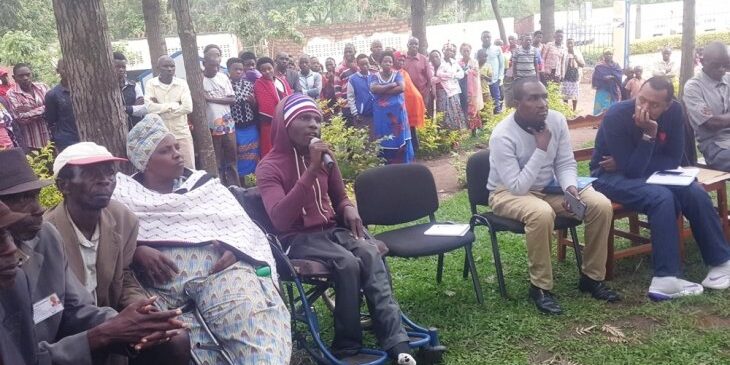Jean Népo Nshimyumuremyi, 25, got physical disability due to meningitis he suffered when he was two years old and subsequently lost abilities to walk. Born in Mukama Sector but currently living in the neighbouring Gatunda Sector in Nyagatare District of the Eastern Rwanda, Nshimyumuremyi hadn’t gone to school until the age of 12 years when an Italian benevolent took him to Gatagara, a centre for persons with disabilities, in Southern Rwanda where he started studying in primary one in 2006.
Jean Népo Nshimyumuremyi, 25, got physical disability due to meningitis he suffered when he was two years old and subsequently lost abilities to walk. Born in Mukama Sector but currently living in the neighbouring Gatunda Sector in Nyagatare District of the Eastern Rwanda, Nshimyumuremyi hadn’t gone to school until the age of 12 years when an Italian benevolent took him to Gatagara, a centre for persons with disabilities, in Southern Rwanda where he started studying in primary one in 2006. Unfortunately, financial constraints forced him to drop out. “I dropped out of school in 2016 when I was in senior five because my sponsor went back to live in Italy. The Italian had misunderstanding with my family because my family was not giving me school materials while he was paying my school fees and boarding facilities,” he told Pan African Visions after a community debate held by Pax Press in Mukama Sector last week.
Speaking from his wheelchair, Nshimyumuremyi pleaded for support to take him back to school to complete his secondary school education or at least support him with a decent residence with proper facilities like a toilet to accommodate his disability. “At Gatagara school, the school fees was at Rwf72,000 per each of the three terms of the year and all expenses for my education roughly goes around Rwf100,000 per term. I live alone because I have no parents and my siblings rejected me. I tried to construct my house with money I made from selling telephone’s airtime but the house is incomplete and I have to live in it the way it is for lacking an alternative,” he says, shedding tears.
Parents of children who have disabilities in Mukama Sector expressed similar concerns, saying that their children’s education is not catered for in their area because the only one school in their district considers visual and hearing impairments only. They said it is even very expensive to keep a child in that school which requires the school fees of Rwf80,000 per term.
Paulin Ntirenganya, Executive Secretary of Mukama Sector, agrees with the complainants and said the advocacy is underway to establish a second school for special needs in Nyagatare District. “There is hope for improvements in services offered to persons with disabilities in the future. We offered 29 wheelchairs to some of them last month and more support will be coming over time to cater for all 503 people with various categories of disabilities in this sector,” said the official.
CSOs chart solutions
In a bid to fight stigma and discrimination among the persons with disabilities (PWDs) while promoting their economic empowerment and inclusive education, UNDP Rwanda has been supporting grassroots empowerment of PWDs through the programme “Strengthening Civil Society Organisations for Responsive and Accountable Governance in Rwanda”, jointly implemented by UNDP and the Rwanda Governance Board (RGB).
Through the programme, CSOs and organisations PWDs have been supported to empower PWDs and advocate for their rights in different sectors of life. During the year 2018-2019, six CSOs were supported in various areas including the right to education for children with disabilities, promotion of Rwandan sign language, and improving the living conditions for deaf and blind people, as well as people with albinism.
The six supported CSOs are Rwanda National Union of the Deaf (RNUD), Rwanda Union of the Blind (RUB), Hillside Hope (HSH), Association des Parents et Amis des Enfants ayant le Handicap au Rwanda (APEH), Organization for Integration and Promotion of People with Albinism (OIPPA) and Media for Deaf (M4D).
Speaking at Disability Inclusion forum in Kigali on Wednesday, Annonciata Nyiragwiza, who is a member of APEH and a teacher for children with disabilities, appealed for elaboration of inclusive education from nursery school to university levels as it is the case for normal people.
The forum aimed, among other objectives, to exchange on key areas affecting the life of PWDs, share experience based on CSO project interventions aimed at empowering PWDS in Rwanda and promoting rights, highlight the challenges PWDs are facing in accessing services in their communities, and to advocate for the rights of PWDs. “We need specialists in special needs to help us care for these children; we need counsellors to help parents who are struggling to understand that a child with disability is worth the care; we need school curriculum and adequate facilities for learners with special needs,” she said.
Emmanuel Ndayisaba, the Director-General of National Council for Persons with Disabilities (NCPD), said the council has been advocating for the issues affecting PWDs and pledged solutions over time as the country’s financial means become available.
Since Rwanda ratified the United Nations Convention on the Rights of Persons with Disabilities (UNCRPD) and its Optional Protocol in 2008 , good progress has been made in protecting the rights of persons with disabilities through legislative reform and programme design. In addition to establishing NCPD, enacting domestic laws and committing to international and regional treaties that support enabling environment for PWDs, the country is developing a national policy on disability and inclusion.
Jean d’Amour Mugabo







